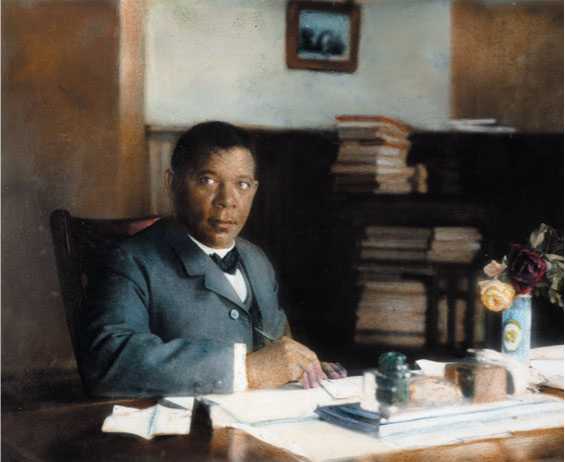Since nearly all contemporary biologists, physicians, and other supposed experts on race were convinced that African Americans were inferior, white Americans generally accepted black inferiority as fact. Most did

Booker T. Washington in his office at Tuskegee Institute, 1900. Washington chose a policy of accommodation. Washington did not urge blacks to accept inferiority and racial slurs but to ignore them. His own behavior was indeed subtle, even devious. In public he minimized the importance of civil and political rights. Behind the scenes he lobbied against restrictive measures, marshaled large sums of money to fight test cases in the courts, and worked hard in northern states to organize the black vote and make sure that black political leaders got a share of the spoils of office.
Not especially wish blacks ill; they simply consigned them complacently to oblivion, along with the Indians. A vicious circle was established. By denying blacks decent educational opportunities and good jobs, the dominant race could use the blacks’ resultant ignorance and poverty to justify the inferior facilities offered them.
Southern blacks reacted to this deplorable situation in a variety of ways. Some sought redress in racial pride and what would later be called black nationalism. Some became so disaffected that they tried to revive the African colonization movement. “Africa is our home,” insisted Bishop Henry M. Turner, a huge, plainspoken man who had served as an army chaplain during the war and as a member of the Georgia legislature during Reconstruction. Another militant, T. Thomas Fortune, editor of the New York Age and founder of the Afro-American League (1887), called on blacks to demand full civil rights, better schools, and fair wages and to fight against discrimination of every sort. “Let us stand up like men in our own organization,” he urged. “If others use. . . violence to combat our peaceful arguments, it is not for us to run away from violence.”
For a time, militancy and black separatism won few adherents among southern blacks. For one thing, life was better than it had been under slavery. Segregation actually helped southern blacks who became barbers, undertakers, restaurateurs, and shopkeepers because whites were reluctant to supply such services to blacks. Even when whites competed with black businesses, the resentment caused by segregation led blacks to patronize establishments run by people of their own race. According to the most conservative estimates, the living standard of the average southern black more than doubled between 1865 and 1900. But this only made many southern whites more angry and vindictive.
This helps explain the tactics of Booker T. Washington, one of the most extraordinary Americans of that generation. Washington had been born a slave in Virginia in 1856. Laboriously he obtained an education, supporting himself while a student by working as a janitor. In 1881, with the financial help of northern philanthropists, he founded Tuskegee Institute in Alabama. His experiences convinced Washington that blacks must lift themselves up by their own bootstraps but that they must also accommodate themselves to white prejudices. A persuasive speaker and a brilliant fundraiser, he soon developed a national reputation as a “reasonable” champion of his race. (In 1891 Harvard awarded him an honorary degree.)
In 1895 Washington made a now-famous speech to a mixed audience at the Cotton States International Exposition in Atlanta. To the blacks he said, “Cast down your bucket where you are,” by which he meant stop fighting segregation and second-class citizenship and concentrate on learning useful skills. “Dignify and glorify common labor,” he urged. “Agitation of questions of racial equality is the extremest folly.” Progress up the social and economic ladder would come not from “artificial forcing” but from selfimprovement. “There is as much dignity in tilling a field as in writing a poem.”
Washington asked the whites of what he called “our beloved South” to lend the blacks a hand in their efforts to advance themselves. If you will do so, he promised, you will be “surrounded by the most patient, faithful, law-abiding, and unresentful people that the world has seen.”
This Atlanta Compromise delighted white Southerners and won Washington financial support in every section of the country. He became one of the most powerful men in the United States, consulted by presidents, in close touch with business and philanthropic leaders, and capable of influencing in countless unobtrusive ways the fate of millions of blacks.
Blacks responded to the compromise with mixed feelings. Accepting Washington’s approach might relieve them of many burdens and dangers. Being obsequious might, like discretion, be the better part of valor. But Washington was asking them to give up specific rights in return for vague promises of future help. The cost was high in surrendered personal dignity and lost hopes of obtaining real justice.
Washington’s career illustrates the terrible dilemma that American blacks have always faced: the choice between confrontation and accommodation. This choice was particularly difficult in the late nineteenth century.




 World History
World History









